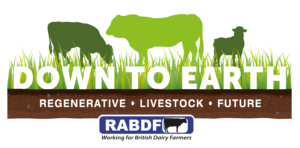Visitors flock in their droves to attend regenerative Down to Earth events
RABDF’s two regenerative Down to Earth events saw record numbers of visitors through their gates, held on 21 June and 6 July, the high visitor numbers highlight the need for knowledge transfer of this kind in an ever-evolving, environmental focused world.
The South day was held at Neil Baker’s 1800 strong pedigree Holstein herd, an Arla pilot scheme farm, and the North at Torpenhow Dairy, home to Mark and Jenny Lee and their 175 cross bred grazing herd, who turned to regenerative farming methods after a lightbulb moment.
Almost 3000 visitors attended across the two events, eager to see the farms regenerative workings, and to listen to specialist speakers, and they weren’t disappointed thanks to a stellar line up of talks.
These included Ted X Talk speaker Ffinlo Costain, who headlined the South event on 21 June, explaining how cows are part of the climate solution, with methane not the primary cause of global warming, and in fact outlined, how the UK is already below the net zero global warming point when it comes to this gas.
He explained: “Cows are an easy distraction from fossil fuels. Carbon tunnel vision means people are fixated on greenhouse gas emissions, when climate change isn’t just about greenhouse gases, it’s also driven by biodiversity loss and desertification.”
“When cows are grazed correctly – by tall sward grazing, for example, they can deliver a cooling effect on the earth and are central to the climate solution.
“Cows in a regenerative farm system help the soil to sequester carbon, they restore ecological connectivity, helping us to solve the climate crisis while also producing fantastic nutrient-dense food, supporting livelihoods, and feeding communities all around the world.”
During his keynote address at the one-day event in Cumbria on 6 July, Rob Percival, Head of Policy, Soil Association & Author, Meat Paradox, explained there’s no one correct way of doing regen.
“It is adaptive, responsive, context matters, and there’s no one template that fits all. It’s the outcomes that really matter.
“It’s a process of experimentation within the water cycles, nutrient cycles, natural pollination, and so on, producing food within the natural landscape while building natural capital,” he said.
The days also had a host of sponsors who are committed to supporting the climate solution within the industry. Mole Valley Farmers, Trinity AgTech, Mootral, Virgin Money, Barenbrug, Kite Consulting, First Milk and AHDB pledged their support in the events and helped disseminate knowledge surrounding the importance of regen farming for our future.
Kite is committed to producing sustainable dairy nutrition in the UK, says Managing Partner, John Allen: “As such we support the RABDF with Down to Earth and believe it is part of promoting and protecting the UK dairy brand. We believe more circular and mixed farming is right for the planet and our industry.”
Supporting the Down to Earth events as a sponsor was a natural fit for First Milk, says Sustainability Director Mark Brooking: “We see First Milk as the Regenerative Co-op; regen principles reflecting our members’ farming systems. Down to Earth has been about accelerating the move towards regenerative farming with inspirational speakers stimulating action among farmers both on the regen journey and looking to begin.
“The Lees’ story alone is quite moving having come through adversity at a time of low milk prices by stepping off the conventional treadmill and turning to regen farming practices. As we’ve seen at these events, dairy done well and regeneratively supports carbon sequestration, biodiversity, water resilience, the list goes on – and is very much part of the climate solution.”
Matt Knight, RABDF Managing Director and Show Organiser, said: “The sheer number of visitors to these events demonstrates the desire for regenerative knowledge. It also reiterates how the term ‘regenerative’ is interpreted differently and means so much more than its surface value.
“The fact Neil is operating an indoor, fully housed intensive system, whilst Mark and Jenny operate a low-input grazed herd, clearly highlights that regenerative principles can be applied no matter what the herd size or system type.”
Earlier this year Down to Earth won the Rising Star Trophy at the Exhibition News (EN) Awards, beating off a number of entries, at the UK event industry’s most prominent awards ceremony. Winning the award is testament to the demand for such an event, with its focus on regenerative farming and protecting the environment and its aim being to equip all farmers with the knowledge they need to make changes, regardless of where they are on their regen journey, Down to Earth has a bright future ahead and will continue to support not only the farming sector but the success of the wider events industry.
For information on future Down to Earth events please check online at www.projectdowntoearth.co.uk and watch our socials for updates.
